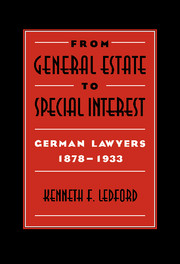Book contents
- Frontmatter
- Contents
- List of Illustrations
- Hierarchy of Courts
- Glossary of Legal and Other Terms
- Abbreviations
- Preface
- 1 The Archimedean Point: Lawyers, Liberalism, and the Middle-Class Project
- 2 Freie Advokatur: The Blending of the Middle-Class and Professional Projects
- 3 Foundation of the Modern Profession: The Private Bar under the Lawyers' Statute
- 4 Institutional Framework: Lawyers and Honoratiorenpolitik
- 5 Growth and Diversification: Lawyers in the Province of Hannover, 1878–1933
- 6 Elites and Professional Ideology: Self-Discipline and Self-Administration by the Anwaltskammer Celle
- 7 Simultaneous Admission: The Limits of Honoratiorenpolitik
- 8 The Limits of Economic Liberalism: Freie Advokatur or Numerus Clausus?
- 9 The Limits of Political Liberalism: Lawyers and the Weimar State
- 10 Conclusion: Lawyers and the Limits of Liberalism
- Methodological Appendix
- Bibliography
- Index
5 - Growth and Diversification: Lawyers in the Province of Hannover, 1878–1933
Published online by Cambridge University Press: 11 September 2009
- Frontmatter
- Contents
- List of Illustrations
- Hierarchy of Courts
- Glossary of Legal and Other Terms
- Abbreviations
- Preface
- 1 The Archimedean Point: Lawyers, Liberalism, and the Middle-Class Project
- 2 Freie Advokatur: The Blending of the Middle-Class and Professional Projects
- 3 Foundation of the Modern Profession: The Private Bar under the Lawyers' Statute
- 4 Institutional Framework: Lawyers and Honoratiorenpolitik
- 5 Growth and Diversification: Lawyers in the Province of Hannover, 1878–1933
- 6 Elites and Professional Ideology: Self-Discipline and Self-Administration by the Anwaltskammer Celle
- 7 Simultaneous Admission: The Limits of Honoratiorenpolitik
- 8 The Limits of Economic Liberalism: Freie Advokatur or Numerus Clausus?
- 9 The Limits of Political Liberalism: Lawyers and the Weimar State
- 10 Conclusion: Lawyers and the Limits of Liberalism
- Methodological Appendix
- Bibliography
- Index
Summary
In the same way that the Imperial Justice Laws in 1879 grafted new institutions onto a preexisting framework, the reforms faced a practicing bar in Germany that already consisted of 4,091 lawyers. But the new rules of freie Advokatur, combined with demographic growth, economic change, and political upheaval between 1879 and 1933 to change dramatically the shape and texture of the bar and the nature of private practice. Free entry and economic opportunity offered new vistas of opportunity for ambitious young men and drew new social elements into the private practice of law. Economic dynamism in large cities made them magnets that attracted many new practitioners, while other cities, formerly important, fell into stagnation because economic growth passed them by. Some previously sleepy towns grew into economic powerhouses, thus inevitably attracting lawyers to serve new clients. As the bar grew, lawyers devised new career strategies and penetrated markets for legal services that they formerly had neglected. Overall, the era of freie Advokatur saw growth and diversification in the practicing bar.
But the changes unleashed in 1879 became apparent only gradually. Persons who had been lawyers under the old system continued to practice under the new, although they faced immediate choices with regard to the place and shape of their legal practices. New members of the bar had to decide where to open their practices and how to seek their livings in entirely changed circumstances and based upon expectations rather than a record of experience.
- Type
- Chapter
- Information
- From General Estate to Special InterestGerman Lawyers 1878–1933, pp. 119 - 176Publisher: Cambridge University PressPrint publication year: 1996



